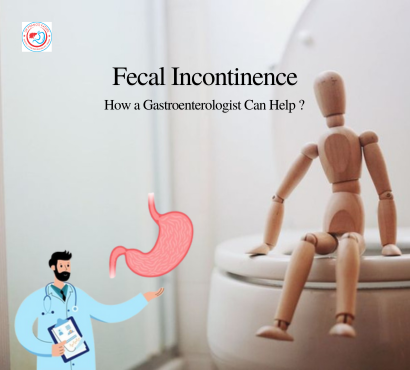Fecal incontinence is one of the most under-discussed yet deeply impactful medical conditions. It refers to the inability to control bowel movements, leading to unintentional leakage of stool. While it may feel embarrassing to talk about, it is more common than many realize, especially among older adults, women after childbirth, and individuals with certain gastrointestinal (GI) or neurological conditions.
The good news is that fecal incontinence is treatable. Gastroenterologists play a key role in diagnosing the root cause and creating tailored treatment plans to restore confidence and quality of life. In this blog, we’ll explore the causes, treatment options, and how a gastroenterologist can help you or your loved one overcome this condition.
Understanding Fecal Incontinence
Fecal incontinence is not just a digestive issue—it also affects emotional well-being, self-esteem, and social life. The severity can range from occasional leakage during gas release to a complete loss of bowel control.
It can be broadly classified into:
- Urge Incontinence – Sudden, uncontrollable urge to pass stool before reaching the toilet.
- Passive Incontinence – Leakage without awareness or warning.
- Overflow Incontinence – When constipation leads to leakage of liquid stool around impacted feces.
Causes of Fecal Incontinence
Fecal incontinence can occur due to multiple reasons. Some common causes include:
1. Muscle Damage
The anal sphincter muscles help control bowel movements. Injury to these muscles—often during childbirth, surgery, or trauma—can reduce bowel control.
2. Nerve Damage
Nerves controlling the rectum and anal sphincter may get damaged due to:
- Diabetes
- Spinal cord injuries
- Multiple sclerosis
- Stroke
When the nerves don’t function properly, bowel sensations and muscle contractions are impaired.
3. Chronic Constipation
Long-term constipation stretches and weakens rectal muscles. Over time, this can lead to overflow incontinence, where liquid stool seeps out.
4. Diarrhea
Loose stools are harder to control, making leakage more likely.
5. Rectal Conditions
- Hemorrhoids may prevent the anal sphincter from closing completely.
- Rectal prolapse (when the rectum slips outside the anus) can weaken bowel control.
6. Age and Lifestyle
Age-related weakening of muscles, sedentary habits, poor diet, and lack of pelvic floor exercise can all contribute.
Symptoms of Fecal Incontinence
While leakage is the most obvious sign, associated symptoms may include:
- Strong, sudden urge to pass stool
- Passing gas with stool leakage
- Constipation followed by diarrhea
- Skin irritation or infections around the anus
- Feeling of incomplete bowel emptying
Diagnosis: How a Gastroenterologist Helps
A gastroenterologist is the right specialist to consult for fecal incontinence. Diagnosis usually involves:
- Medical History & Physical Examination – Understanding bowel habits, lifestyle, and medical background.
- Anorectal Manometry – Measures the strength of rectal and anal sphincter muscles.
- Endoscopy / Colonoscopy – To rule out structural problems like tumors or polyps.
- MRI or Ultrasound – To detect muscle or nerve injuries.
- Stool Tests – To check for infections, inflammation, or malabsorption.
Treatment Options for Fecal Incontinence
Treatment depends on the underlying cause, severity, and patient health. Common approaches include:
1. Lifestyle and Dietary Modifications
- Fiber-rich diet (fruits, vegetables, whole grains) for regular bowel movements.
- Adequate hydration to prevent constipation.
- Avoid trigger foods such as caffeine, spicy food, alcohol, and dairy (if lactose intolerant).
2. Pelvic Floor and Sphincter Exercises
- Kegel exercises strengthen pelvic muscles.
- Biofeedback therapy helps patients improve awareness and control of rectal muscles.
3. Medications
- Anti-diarrheal drugs (e.g., loperamide) to firm stools.
- Laxatives for constipation-related incontinence.
- Stool-bulking agents to regulate consistency.
4. Bowel Training
Establishing a fixed toilet routine can retrain bowel control.
5. Minimally Invasive Procedures
- Nerve stimulation therapy improves communication between brain and bowel.
- Injectable bulking agents strengthen anal muscles.
6. Surgical Options
- Sphincter repair surgery (for torn muscles).
- Colostomy (last resort, creating an opening in the abdomen for waste).
Emotional and Social Impact
Fecal incontinence often leads to shame, withdrawal, and depression. Many people avoid seeking help due to stigma. However, timely consultation with a gastroenterologist can make a life-changing difference.
Prevention Tips
- Maintain a balanced, fiber-rich diet.
- Stay active and do pelvic floor exercises.
- Avoid excessive straining during bowel movements.
- Treat chronic constipation and diarrhea early.
- Seek medical help immediately if symptoms persist.
FAQs
Q1. Can fecal incontinence be completely cured?
In many cases, yes. Mild cases often improve with dietary changes, exercises, and medications. Severe cases may require advanced procedures or surgery.
Q2. Is fecal incontinence a normal part of aging?
No. While it is more common in older adults due to weakened muscles, it should not be considered a “normal” part of aging. With proper care, it can be managed effectively.
Q3. When should I see a gastroenterologist for fecal incontinence?
If leakage occurs more than once or interferes with your daily life, consult a gastroenterologist immediately. Early diagnosis leads to better outcomes.


